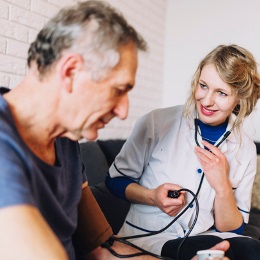Licensed Practical or Vocational Nursing Courses
How to Select the Right One Near Philadelphia Pennsylvania
 Once you have decided on a fulfilling vocation in the field of nursing, it's imperative that you choose a Licensed Practical Nurse (LPN) college near Philadelphia PA that will deliver the necessary instruction. Texas or California residents will alternatively enroll in an LVN school to learn to become a Licensed Vocational Nurse. There is no distinction, apart from the names, between an LPN and LVN. They both undertake the same job functions and work in healthcare facilities under the supervision of Registered Nurses (RN) or Doctors. Although, as we will cover in this article, their routine job functions can vary depending on the state where they are practicing. Many nursing candidates begin by looking for schools that are close to their homes and of those target the one that is least expensive. While tuition and location are significant points to consider, they are not the only criteria that you should base your decision on. For example are the schools accredited or do they have high pass rates on the licensing exam, which are both extremely important too. There are additional questions that you should ask prospective schools before enrolling in a LPN or LVN training program that we will discuss later in this article. But to start with, let's look at the role of an LPN and what is involved in the education and licensing process.
Once you have decided on a fulfilling vocation in the field of nursing, it's imperative that you choose a Licensed Practical Nurse (LPN) college near Philadelphia PA that will deliver the necessary instruction. Texas or California residents will alternatively enroll in an LVN school to learn to become a Licensed Vocational Nurse. There is no distinction, apart from the names, between an LPN and LVN. They both undertake the same job functions and work in healthcare facilities under the supervision of Registered Nurses (RN) or Doctors. Although, as we will cover in this article, their routine job functions can vary depending on the state where they are practicing. Many nursing candidates begin by looking for schools that are close to their homes and of those target the one that is least expensive. While tuition and location are significant points to consider, they are not the only criteria that you should base your decision on. For example are the schools accredited or do they have high pass rates on the licensing exam, which are both extremely important too. There are additional questions that you should ask prospective schools before enrolling in a LPN or LVN training program that we will discuss later in this article. But to start with, let's look at the role of an LPN and what is involved in the education and licensing process.
It Takes Just a Few Minutes to Start Your LPN or LVN Career Below
LPN and LVN Job Description

Licensed Practical Nurses have a number of duties that they complete in the Philadelphia PA medical facilities where they practice. As their titles signify, they are required to be licensed in all states, including Pennsylvania. While they may be responsible for monitoring Certified Nursing Assistants (CNA), they themselves generally work under the guidance of either an RN or a doctor. The healthcare facilities where they work are numerous and varied, such as hospitals, medical clinics, schools, and long-term care facilities. Anywhere that you can find patients requiring medical care is their domain. Each state not only controls their licensing, but also what duties an LPN can and can't perform. So based on the state, their daily work functions can include:
- Taking vital signs
- Administering medications
- Initiating IV drips
- Monitoring patients
- Collecting blood or urine samples
- Maintaining patient records
- Supporting physicians or RNs with procedures
In addition to their occupational duties being governed by each state, the medical facilities or other Philadelphia PA healthcare providers where LPNs work can further limit their job roles within those parameters. Also, they can practice in numerous specialties of nursing, for example long-term care, critical care, oncology and cardiology.
LVN and LPN Degree and Certificate Programs
There are principally two scholastic credentials available that provide training to become an LPN near Philadelphia PA. The one that can be completed in the shortest time frame, generally about one year, is the certificate or diploma course. The next option is to attain a Practical Nursing Associate Degree. These LPN programs are more comprehensive in nature than the diploma alternative and usually require 2 years to finish. The advantage of Associate Degrees, aside from providing a higher credential and more extensive instruction, are that they furnish more transferable credit toward a Bachelor's Degree in nursing. Regardless of the type of credential you seek, it needs to be state approved and accredited by the National League for Nursing Accrediting Commission (NLNAC) or any other national accrediting organization. The NLNAC guarantees that the course of study adequately prepares students to become Practical Nurses, and that the majority of graduates pass the 50 state required NCLEX-PN licensing exam.LPN and LVN Programs Online
 Attending LPN or LVN schools online is emerging as a more popular way to get training and attain a nursing certificate or degree in Philadelphia PA. Some schools will require attending on campus for part of the training, and almost all programs call for a certain number of clinical rotation hours completed in a local healthcare center. But since the rest of the training can be accessed online, this alternative may be a more accommodating answer to finding the time to attend classes for some students. Regarding tuition, many online degree programs are cheaper than other on campus choices. Even supplementary expenses such as for commuting and study materials can be lessened, helping to make education more affordable. And many online programs are accredited by U.S. Department of Education recognized organizations. And so if your work and household responsibilities have left you with little time to pursue your academic goals, maybe an online LPN program will make it easier to fit a degree into your active schedule.
Attending LPN or LVN schools online is emerging as a more popular way to get training and attain a nursing certificate or degree in Philadelphia PA. Some schools will require attending on campus for part of the training, and almost all programs call for a certain number of clinical rotation hours completed in a local healthcare center. But since the rest of the training can be accessed online, this alternative may be a more accommodating answer to finding the time to attend classes for some students. Regarding tuition, many online degree programs are cheaper than other on campus choices. Even supplementary expenses such as for commuting and study materials can be lessened, helping to make education more affordable. And many online programs are accredited by U.S. Department of Education recognized organizations. And so if your work and household responsibilities have left you with little time to pursue your academic goals, maybe an online LPN program will make it easier to fit a degree into your active schedule.
Things to Ask LPN and LVN Schools
Once you have decided on obtaining your LPN or LVN certificate or degree, as well as if you will attend classes on campus or on the web, you can utilize the following pointers to begin narrowing down your choices. As you undoubtedly realize, there are numerous nursing schools and colleges near Philadelphia PA as well as within Pennsylvania and throughout the United States. So it is essential to decrease the number of schools to choose from so that you will have a manageable list. As we already mentioned, the location of the school as well as the cost of tuition are undoubtedly going to be the first two things that you will take into consideration. But as we also emphasized, they should not be your only qualifiers. So before making your ultimate selection, use the following questions to evaluate how your selection compares to the other programs.
- Accreditation. It's a good idea to make sure that the certificate or degree program as well as the school are accredited by a U.S. Department of Education recognized accrediting organization. Besides helping confirm that you get a premium education, it may help in acquiring financial aid or student loans, which are frequently not provided for non-accredited schools near Philadelphia PA.
- Licensing Preparation. Licensing prerequisites for LPNs and LVNs vary from state to state. In all states, a passing score is required on the National Council Licensure Examination (NCLEX-PN) in addition to graduation from an accredited school. Some states require a certain number of clinical hours be performed, as well as the passing of additional tests. It's essential that the school you are attending not only provides an exceptional education, but also prepares you to meet the minimum licensing standards for Pennsylvania or the state where you will be practicing.
- Reputation. Look at internet rating services to see what the reviews are for each of the LPN or LVN schools you are considering. Ask the accrediting organizations for their reviews as well. Also, check with the Pennsylvania school licensing authority to check out if there are any complaints or compliance issues. Finally, you can speak with some local Philadelphia PA healthcare organizations you're interested in working for after graduation and ask what their assessments are of the schools as well.
- Graduation and Job Placement Rates. Find out from the LPN or LVN schools you are looking at what their graduation rates are as well as how long on average it takes students to complete their programs. A low graduation rate may be an indication that students were unhappy with the program and dropped out. It's also imperative that the schools have high job placement rates. A high rate will not only substantiate that the school has a favorable reputation within the Philadelphia PA medical community, but that it also has the network of relationships to help students obtain a position.
- Internship Programs. The most ideal way to get experience as a Licensed Practical Nurse is to work in a clinical environment. Almost all nursing degree programs require a certain number of clinical hours be completed. Various states have minimum clinical hour prerequisites for licensing too. Check if the schools have a working relationship with local Philadelphia PA community hospitals, clinics or labs and assist with the placing of students in internships.
Learn More Info About Becoming an LVN or LPN in Philadelphia
Enroll in the Right Philadelphia LPN or LVN School
Picking the ideal Licensed Practical Nurse school is arguably the most critical step to starting a new career in the healthcare industry. There are a number of variables that you should consider when picking a nursing school. These factors will be prioritized differently depending on your current career goals, obligations, and financial status. As we have emphasized in this content, it is essential that you pick an LPN college and a certificate or degree program that are each accredited and have exceptional reputations within the medical community. By using our list of qualifying questions, you will be able to create a short list of schools to pick from so that you can make your final selection. And with the proper degree and training, combined with your hard work and desire to succeed, you can become an LPN or LVN in Philadelphia Pennsylvania.
PHILADELPHIA LPN OR LVN SCHOOLS | PHILADELPHIA LPN OR LVN PROGRAMS ONLINE
